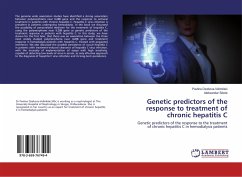
Genetic Signatures for Progression and Response of Hepatitis C
Apoptosis and Hepatitis C: Genetic and Hormonal Predictors
Versandkostenfrei!
Versandfertig in 6-10 Tagen
51,99 €
inkl. MwSt.

PAYBACK Punkte
26 °P sammeln!
The hepatitis C virus (HCV), the silent killer, is endemic worldwide. Therefor, finding novel signatures for HCV progression and response to anti-viral therapies is very important in terms of diagnosis and prognosis of the disease. P53 induces the expression of Fas for triggering apoptosis; an important mechanism for limiting viral replication. This study aims at investigating the impact of P53 rs 1042522 and Fas rs 1800682 genetic polymorphisms at 72 Arg/Pro and -670 A/G respectively on HCV susceptibility and treatment response. Quantitation of HCV-RNA by qRT-PCR and histological scores were ...
The hepatitis C virus (HCV), the silent killer, is endemic worldwide. Therefor, finding novel signatures for HCV progression and response to anti-viral therapies is very important in terms of diagnosis and prognosis of the disease. P53 induces the expression of Fas for triggering apoptosis; an important mechanism for limiting viral replication. This study aims at investigating the impact of P53 rs 1042522 and Fas rs 1800682 genetic polymorphisms at 72 Arg/Pro and -670 A/G respectively on HCV susceptibility and treatment response. Quantitation of HCV-RNA by qRT-PCR and histological scores were performed for every patient, as well as genotyping of HCV-RNA, P53 at 72 Arg/Pro, and Fas at -670 A/G polymorphisms were done for all subjects. In addition, hormonal profiling for all patients and controls were investigated and correlated with the genetic signatures, providing a strong multi-signatures for HCV progression and response.












